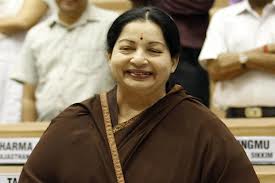
Chennai, Jan 21: Intensifying the legal battle over the Cauvery issue, Tamil Nadu Government today decided to move the Supreme Court seeking damages from Karnataka for the loss of crops caused by the neighbouring state's "adamant approach" on release of water.
Initiating yet another litigation on the bitter decades-old Cauvery row between the two riparian states, Chief Minister Jayalalithaa ordered officials to file a suit in the apex court claiming damages to compensate for the loss of Kuruvai (short-term) and Samba (long-term) paddy crops in the state.
Listing out various petitions filed by her government, she said despite directions by the Supreme Court and Cauvery Monitoring Committee (CMC), Karnataka had not released water in "appropriate way", following which the crops have been "largely affected".
Besides, hydro power generation had also been affected, she said in an official statement here.
"Considering the adamant approach of Karnataka in not releasing due share of water to Tamil Nadu in line with existing Tribunal verdict, which has been recorded by the CMC, I have directed (officials) to file an original suit claiming damages from Karnataka to compensate the damages suffered by Tamil Nadu" regarding crop-loss, she said.
Jayalalithaa said that a high-level panel appointed under Finance Minister O Panneerselvam to assess the situation in the Cauvery delta districts in the wake of the crisis, will submit its report soon following which her government will take appropriate action, she said.
Complying with a Supreme Court order in December, Karnataka had released water for some days but stopped it citing depleted storage of water in its reservoirs.
Tamil Nadu has also been piling pressure on the Centre to notify the final award of the Cauvery Water Dispute Tribunal given in February 2007 but Karnataka has opposed it citing pendency of petitions challenging the award in the Supreme Court.
Jayalalithaa said that following a November 2012 direction of Supreme Court, she had visited Bangalore for a meeting with her Karnataka counterpart Jagadish Shettar.
"Karnataka said it could not release a drop of water," in response to Tamil Nadu's demand for 30 tmcft within the next 15 days then, following which the state knocked at the doors of Supreme Court again.
The CMC also met on the directions of the apex court and directed Karnataka to release 12 tmcft of water in December 2012. Tamil Nadu moved Supreme Court seeking 18 tmcft, she said.
The CMC in its January 10, 2013 meeting held that there was a shortfall of 31.4 tmcft on part of Karnataka as per the distress sharing formula between June 1-December 31 last year and her government filed one more petition in the Supreme court seeking 12 tmcft of water which would come up on January 28, 2013, she said.





Comments
Add new comment